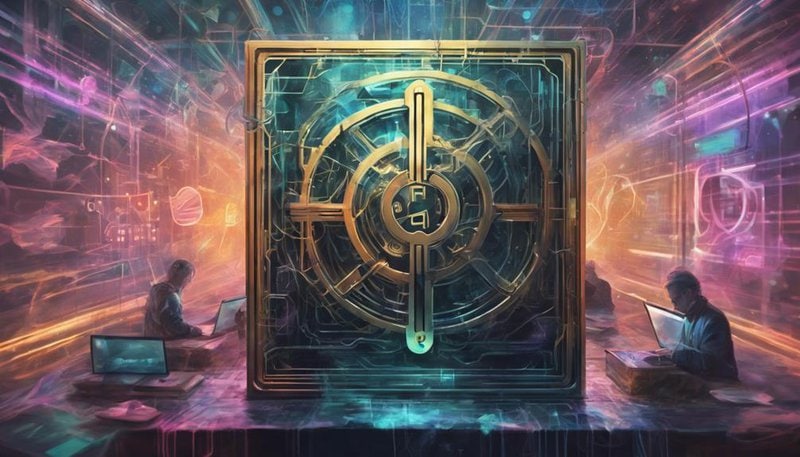What Intellectual Property Rights Do NFT Owners Have?

NFT owners may have the ability to prove ownership of a digital asset through blockchain technology and smart contracts. However, this ownership does not necessarily equate to full intellectual property rights. NFTs typically do not grant exclusive rights to reproduce or distribute the underlying content, as these rights are often retained by the original creator or copyright holder. Consequently, while NFTs offer unique ownership and authenticity benefits, they do not confer comprehensive intellectual property protections.
In practical terms, this means that owning an NFT of a digital artwork, for example, does not automatically grant the purchaser the right to make copies of the artwork, display it publicly, or use it in commercial activities. The scope of rights associated with an NFT is determined by the terms set out in the smart contract governing the transaction. Therefore, understanding these terms and any associated intellectual property rights is crucial for both NFT creators and buyers to avoid potential legal issues and disputes.
Understanding NFT Ownership Rights
Understanding NFT ownership rights involves recognizing the unique digital ownership framework that underpins non-fungible tokens in the modern blockchain ecosystem. As an NFT owner, you hold ownership rights to a specific digital asset, entitling you to buy, sell, and even license it. When you purchase an NFT, you acquire the rights specified by the creator, often including the right to display or resell the digital asset. These ownership rights are embedded in the NFT's smart contract, ensuring that you have a secure and verifiable claim over the digital asset.
Regarding resale, NFT ownership grants you the ability to transfer your ownership rights to another party. This transfer can occur on NFT marketplaces or through private sales, giving you the freedom to profit from your investment. Additionally, some NFTs come with licensing options, allowing you to dictate how others can use or interact with the digital asset. Understanding these ownership rights is crucial for navigating the evolving landscape of digital ownership and ensuring that you make informed decisions as an NFT owner.
Copyright Considerations for NFTs
In the realm of NFT ownership, navigating copyright considerations is paramount for safeguarding the creative integrity and legal rights associated with your digital assets. When you own an NFT, you hold a unique token linked to a specific digital asset. However, it's crucial to understand that owning an NFT doesn't automatically grant you copyright ownership of the underlying work. Copyright law grants the creator exclusive rights to reproduce, distribute, display, and create derivative works based on the original creation.
When it comes to NFTs, the concept of fair use is also essential. Fair use allows for the limited use of copyrighted material without permission under certain circumstances, such as for purposes of criticism, commentary, or parody. As an NFT owner, it's vital to respect the original creator's rights and consider whether your use of the NFT falls within the boundaries of fair use.
Additionally, creating derivative works based on NFTs may raise copyright concerns, so it's wise to seek permission or ensure your use complies with copyright law to avoid potential legal issues.
Trademark Protection for NFT Owners

Trademark protection is a crucial consideration for NFT owners to safeguard their digital assets and brand identity in the ever-evolving landscape of blockchain technology. Ensuring that your NFTs are adequately protected through trademarks can provide you with a competitive edge and legal recourse if infringement occurs.
Here are three essential aspects to consider regarding trademark protection for NFT owners:
- Brand Identity: Registering trademarks for your NFTs can help solidify your brand identity in the digital space, making it easier for consumers to recognize and trust your creations.
- Market Differentiation: Trademarks enable you to distinguish your NFTs from others in the market, enhancing your market positioning and setting your creations apart from competitors.
- Legal Protection: By securing trademarks for your NFTs, you establish a legal foundation to defend your brand against unauthorized use, counterfeit products, or other forms of infringement.
Prioritizing trademark protection for your NFTs isn't just about legal compliance; it's about safeguarding your artistic reputation and commercial interests in the dynamic world of blockchain technology.
Licensing NFTs and Intellectual Property
When it comes to licensing NFTs and protecting your intellectual property, it's crucial to understand the terms of NFT licensing agreements and how they safeguard your creations.
By delving into the intricacies of intellectual property protection for NFTs, you can ensure that your digital assets are properly secured and respected.
Navigating the realm of NFT licensing and intellectual property rights empowers you to make informed decisions that preserve the value and integrity of your unique creations.
NFT Licensing Agreements
Navigating the complexities of NFT licensing agreements requires careful consideration of how intellectual property rights are transferred and maintained within the digital realm. When delving into the realm of NFT licensing, here are three critical aspects to keep in mind:
- NFT Licensing Models: Understanding the different licensing models available for NFTs is crucial. Whether it's an exclusive license, non-exclusive license, or another form, each model comes with its own implications for both the creator and the owner.
- Ownership Disputes: Anticipating and addressing potential ownership disputes beforehand can save you from legal complications down the line. Clearly outlining ownership rights in the licensing agreement is key to preventing disputes.
- Intellectual Property Protection: Ensuring that the licensing agreement includes robust intellectual property protection clauses is essential for safeguarding your rights as an NFT owner.
IP Protection for NFTs
As you embark on exploring the realm of NFT licensing and intellectual property, understanding the nuances of IP protection for NFTs becomes paramount to safeguarding your rights as a digital asset owner. When it comes to NFT ownership rights, legal implications are significant. Ensuring proper IP protection for your digital assets can help you avoid potential conflicts and infringement issues. By licensing your NFTs correctly, you can establish clear guidelines for their use, distribution, and reproduction. Remember, digital assets hold great value, and safeguarding them through robust IP protection measures is essential in today's evolving landscape of blockchain technology and digital ownership.
| NFT Ownership Rights | Legal Implications |
|---|---|
| Clarify Usage Rights | Avoid Infringement |
| Establish Distribution Terms | Prevent Unauthorized Use |
NFTs and Digital Resale Rights

To fully comprehend the implications of NFT ownership, one must delve into the intricate realm of digital resale rights. When considering NFTs and digital resale rights, keep these key points in mind:
- Ownership Transfer: Once you purchase an NFT, you hold the token representing ownership of a unique digital asset. However, this ownership doesn't always entail the right to commercially exploit or distribute the underlying content.
- Resale Permissions: While you can resell your NFT, the rights associated with the digital content itself may not automatically transfer to the new owner. The original creator's intellectual property rights still govern the use of the content.
- Licensing Terms: Some NFT platforms or creators may specify licensing terms that dictate how the NFT can be resold or utilized. It's crucial to understand these terms to avoid infringing on intellectual property rights or violating platform policies.
Navigating the nuances of digital resale rights in the realm of NFTs requires a keen awareness of both the token ownership and the underlying content's intellectual property rights.
Enforcing IP Rights in the NFT Space
Understanding the importance of safeguarding intellectual property rights within the NFT space is paramount for both creators and collectors alike. In the realm of enforcing IP rights in the NFT space, challenges can arise due to the decentralized and pseudonymous nature of transactions. Ownership disputes can emerge when determining the true creator or owner of an NFT, leading to complexities in enforcing rights.
Enforcement challenges in the NFT space often stem from the lack of centralized authority to regulate transactions and resolve disputes swiftly. When ownership disputes surface, it can be challenging to establish clear ownership rights without traditional legal frameworks in place. This presents a unique hurdle for NFT owners seeking to protect their intellectual property rights effectively.
Navigating enforcement challenges and ownership disputes requires a nuanced approach that combines technological solutions with legal expertise. As the NFT ecosystem continues to evolve, addressing these challenges will be crucial in ensuring the integrity of intellectual property rights within this innovative digital landscape.
Risks of Infringement in NFT Transactions

As you navigate the world of NFT transactions, it's crucial to be aware of the copyright risks that could arise, potentially leading to infringement issues.
Additionally, trademark concerns in the NFT space shouldn't be overlooked, as they can have significant implications for both creators and buyers.
Understanding the legal ramifications associated with NFT transactions is paramount to safeguarding your intellectual property rights in this evolving landscape.
Copyright Risks in NFTs
Navigating the world of NFTs entails understanding the inherent copyright risks that come with transactions involving these digital assets. When dealing with NFTs, it's crucial to be aware of the legal implications surrounding copyright issues.
Here are three key points to consider:
- Originality Matters: Ensure that the NFT you're buying or creating is original content to avoid infringing on someone else's copyright.
- License Verification: Check the terms of the license associated with the NFT to confirm that the creator has the right to sell the digital asset.
- Public Domain Pitfalls: Be cautious when dealing with NFTs based on public domain works, as there may still be copyright restrictions in certain contexts.
Trademark Concerns in NFTs
When delving into the realm of NFTs, one must be vigilant about potential trademark concerns to mitigate risks of infringement in transactions involving these digital assets. Trademark enforcement is crucial in the NFT space to ensure brand protection and prevent unauthorized use of protected marks. NFT creators and buyers should conduct thorough trademark searches before minting or purchasing NFTs to avoid infringing on existing trademarks. Utilizing verified platforms for NFT transactions can also help in reducing the chances of inadvertently breaching trademark rights. By staying informed about intellectual property laws and seeking legal advice when necessary, individuals can navigate the NFT landscape while safeguarding themselves against trademark violations.
| Trademark Concerns | Mitigation Strategies |
|---|---|
| Trademark Searches | Verify before minting |
| Verified Platforms | Trustworthy transactions |
| Legal Guidance | Intellectual property laws |
| Brand Protection | Prevent infringement |
Legal Implications for NFTs
To safeguard your interests in the realm of NFT transactions, it's imperative to understand the legal implications surrounding potential risks of infringement, particularly concerning intellectual property rights. When delving into the NFT space, consider the following:
- Ownership Rights: Ensure that the NFT you're purchasing grants you the full rights to the underlying digital asset or content. Verify the creator's authorization to sell the NFT to avoid any ownership disputes down the line.
- Legal Implications in NFT Marketplaces: Be aware of the terms and conditions of the NFT marketplace where you're conducting transactions. Understand how they handle copyright infringement claims and what protections they offer to buyers.
- Resale Rights: Clarify whether the NFT you own allows you to resell it and whether any royalties or permissions are required for subsequent sales. Understanding these rights upfront can prevent legal entanglements in the future.
Future of IP Rights in NFTs

Embracing the evolving landscape of non-fungible tokens (NFTs) necessitates a deep understanding of how intellectual property rights will shape the future of this digital realm. As NFTs continue to gain traction, the future of intellectual property (IP) rights in this space is a topic of significant interest.
Ownership challenges within NFT marketplaces have already sparked discussions on the importance of clarifying and protecting the rights of creators and buyers. Legal implications, particularly concerning smart contracts, will play a crucial role in defining these rights moving forward.
Looking ahead, the future of IP rights in NFTs will likely see advancements in the development of clearer frameworks and regulations. This evolution will strive to address current ambiguities and provide greater security for all parties involved in NFT transactions.
As the technology supporting NFTs matures, the implementation of smart contracts and blockchain solutions will further streamline the management of IP rights. By staying informed and engaged with these developments, you can navigate the future of IP rights in NFTs more confidently and effectively.
Frequently Asked Questions
Can NFT Owners Transfer Their Intellectual Property Rights to Someone Else?
When transferring ownership of NFTs, ensure you understand the legal implications. Licensing agreements can grant rights, but copyright protection may still apply. Be wise and seek guidance to navigate intellectual property rights effectively.
How Can NFT Owners Protect Their Digital Assets From Being Copied or Reproduced?
To safeguard your digital assets from unauthorized duplication or piracy, consider implementing robust anti-piracy measures and copyright protection strategies. Ownership protection is vital in preventing copyright infringement and ensuring the security of your NFTs.
Are There Any Limitations to the Types of Intellectual Property That Can Be Associated With an Nft?
When associating intellectual property with an NFT, consider the nature of digital artwork and the importance of copyright protection. Understand the limitations that may exist in safeguarding these assets, ensuring your creative work remains secure.
What Legal Actions Can NFT Owners Take if Their Intellectual Property Rights Are Violated in the NFT Space?
If your intellectual property rights are violated in the NFT space, you have legal remedies at your disposal. Copyright infringement can be addressed through enforcement options, protecting your ownership rights in the digital realm.
How Do NFT Owners Ensure That the Digital Assets They Purchase Are Not Infringing on Someone Else's Intellectual Property Rights?
To ensure your NFTs don't violate others' rights, verify ownership, watch for copyright violations. Protect digital assets through licensing agreements. It's essential to respect intellectual property to uphold the value of NFTs.











